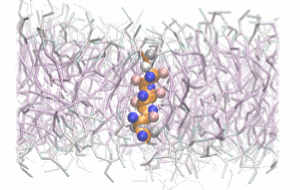Tristan Bereau, W. F. Drew Bennett, Jim Pfaendtner, Markus Deserno and Mikko Karttunen, J. Chem. Phys. (2015)
We compare thermodynamic properties of a transmembrane helix between coarse-grained and atomistic models
The anchor of most integral membrane proteins consists of one or several helices spanning the lipid bilayer. The WALP peptide, GWW(LA)n(L)WWA, is a common model helix to study the fundamentals of protein insertion and folding, as well as helix-helix association in the membrane. Its structural properties have been illuminated in a large number of experimental and simulation studies. In this combined coarse-grained and atomistic simulation study, we probe the thermodynamics of a single WALP peptide, focusing on both the insertion across the water-membrane interface, as well as folding in both water and a membrane. The potential of mean force characterizing the peptide’s insertion into the membrane shows qualitatively similar behavior across peptides and three force fields. However, the Martini force field exhibits a pronounced secondary minimum for an adsorbed interfacial state, which may even become the global minimum—in contrast to both atomistic simulations and the alternative PLUM force field. Even though the two coarse-grained models reproduce the free energy of insertion of individual amino acids side chains, they both underestimate its corresponding value for the full peptide (as compared with atomistic simulations), hinting at cooperative physics beyond the residue level. Folding of WALP in the two environments indicates the helix as the most stable structure, though with different relative stabilities and chain-length dependence.

